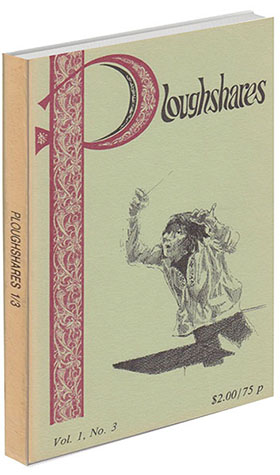rev. of Memory’s Handgrenade by Thomas Lux
It is easy in one way to review Thomas Lux's
Memory's Handgrenade because the book is such a pleasure to read and re-read. It is also easy to be misled: one keeps hearing other voices in his work. There is W.S. Merwin, with whom Lux shares a concern for subjects like gloves (Merwin: "gloves of blood." Lux: "Gloves of grief."), the desert (Merwin: "This must be what I wanted to be doing,/Walking at night between the two deserts,/Singing." Lux: "a man in the desert tapping/a small hammer on a railroad track."), memory, ashes, water, and salt (Merwin: "My friend . . . with a nest of salt in his hand." Lux: "No more driving all night/with the coldest cup of salt beside you."). I quote also this one stanza from Merwin, which has theme and image in common with Lux:
It you want to come after me for any reason
I have left money in the bread-box,
Heart in the ice-box,
And in the mail-box, around the key,
A handkerchief for good-byes.
("Route with No Number")
Yet while Lux shares many of the same words or phrases with Merwin, he does not sound like Merwin: Merwin's voice is strange and distant, like his world; Lux's voice is more immediate and less ethereal, partly because his poems contain more narrative. Lux also reminds one of James Tate, but in this case it is not only a matter of reminiscent phrases and images (Tate: "I will sigh noisily, as if an old and/disgusting leg had finally dropped off." Lux: "Your legs become rotten/and fall off."), it is a matter of voice. Both poets at times assume a casual, almost jaunty voice to describe what, for some other poet, would be unspeakable surrealistic horror. Lux calls it "a casual gloom" in "The White and Gray Matters." But this comparison, too, is misleading. When Lux reads these poems aloud, the audience will not get giddy, as they sometimes do when Tate reads.
Many of Lux's poems have a game-like quality. They seem to prescribe, to give directions, in that casual, jaunty voice. A few times the game is purely academic and the poem fails. "Your New Gloves" fails, for example, because the reader does not know the reason for the ironic reversal at the end of the poem. Yet I think other poems, many other poems with this quality, are marvelous successes:
Tonight I'm sleeping on the roof because
each night
when I sleep in bed,
I inevitably fall out of it.
The bed is only 2 feet
from the floor. . . .I'm sleeping near the edge
of the roof.
It's a test of my subconscious, that blind
swimmer with a candle
in his mouth.If I fall off, it may be possible,
for the first time,
to measure the speed of sleep,
how fast and how deep we fall.
If I don't: thisis where I'll sleep every night.
I think I'll feel comfortable,
for which one of us has never fallen
a thousand feet, or more,
asleep?
("
Sleeping on the Roof")
Unlike "Your New Gloves," this poem has some archetypal fright for the reader (and some comfort, too) in its deep exploration of the limits of the subconscious. The central situation of the poem is enriched by a very appropriate and frightening metaphor: "My subconscious, that blind/swimmer with a candle/in his mouth." There are other poems that are prescriptive or give directions as if for a game, and one can see this quality even in the titles: "How to Cure Your Fever," "How to Find Love," "If You See This Man," "The Handkerchief Trick," and "The Midnight Tennis Match" "The Cave or the Mine," one of nine prose poems in the book,seems to be a variation of a parable about reality and the ascension to the intellectual world as related in Book VII of Plato's
Republic. Whether the other being below us in the cave or mine is a lover or murderer makes little difference — the important thing is that the shadow is there. What also struck me about this poem was an ending which seems to allow the persona to escape — "Your other choice is never to leave your apartment" — until we realize that the apartment below could be the cave or the mine.
Some of the humor in Lux's poems comes from the games he constructs; in other cases it comes from the tone he assumes. Poems like "My Malaria," "Dear Mogul," and "Five Men I Know" all assume a casual tone in the face of something frightening. Sometimes that tone comes from colloquial phrases like "honestly," "after all," or "but listen," and it is a technique that, in the hands of the wrong poet, can begin to sound very gimmicky. Lux, however, has superb imagery and figurative language to back him up: "Honestly, I look up to you./I admire your trench/of a life." ("Dear Mogul") These colloquial phrases stand up because Lux creates tone in other ways too. At times he uses the straight-faced understatement of the stand-up comedian:
The last one is being chased by a man
with a hammer. The man running
wears a body cast.
He has been wearing it for centuries.
The man with the hammer
wants to remove it.
("
Five Men I Know")
Part of his humor comes also from image and juxtaposition:
Another one dreams
he is reading the
Duino Elegies aloud,
in German, at a racetrack in Florida.
In his dream
the flamingos are drained of their color
and collapse.
("
Five Men I Know")
Other poems simply tell a funny story. "The Gas Station" begins simply and directly, but it slowly accrues a kind of outrageousness that makes distubing sense. "Metals & Alloys" also turns its humor and surrealism to a serious point.
"The Day of the Lacuna," Lux's long, last poem summarizes, in a sense, a subject which concerns him throughout the book: communication between people, between lovers, between ego and alter ego. It is full of the sad humor and sharp wit which characterizes other poems:
No more foolish swordsman
trying to marry
the weightlifter's daughter.
Climbing trees
with your hands in your pockets,
vacationing on ice-floes,
it's all over.
The poem is unified by various kinds of lacunae appearing again and again (pock marks, empty clothes, empty drawers, empty apartment, shell holes, and finally, the abyss), the problem of Memory (how to forget, how to remember: "And the woman, don't forget her . . ."), and the pain and vacillation involved in lost love.
Thomas Lux's first major collection is excellent: he has a sharp sense of the lyrical and he is an engaging story-teller. There are many other fine poems that I have not mentioned: "The Museum," "Ten Notes to M," "Six Stanzas from a Dream," "A Farrago of Birds," (to name only a few) and especially "Invitation to the Seeress," a poet's poem, but not for the usual literary reasons — that surprise is only one of many in
Memory's Handgrenade.

